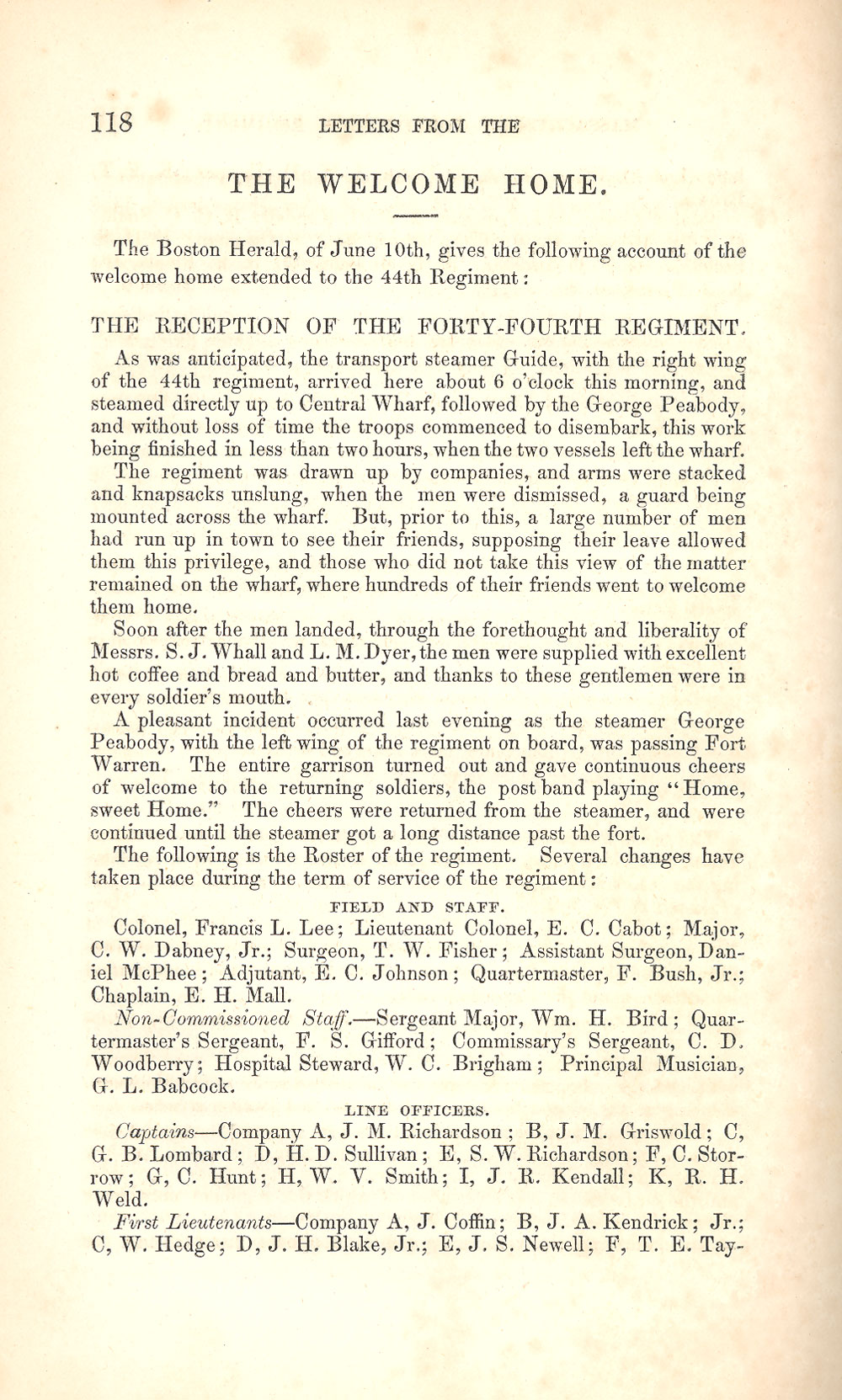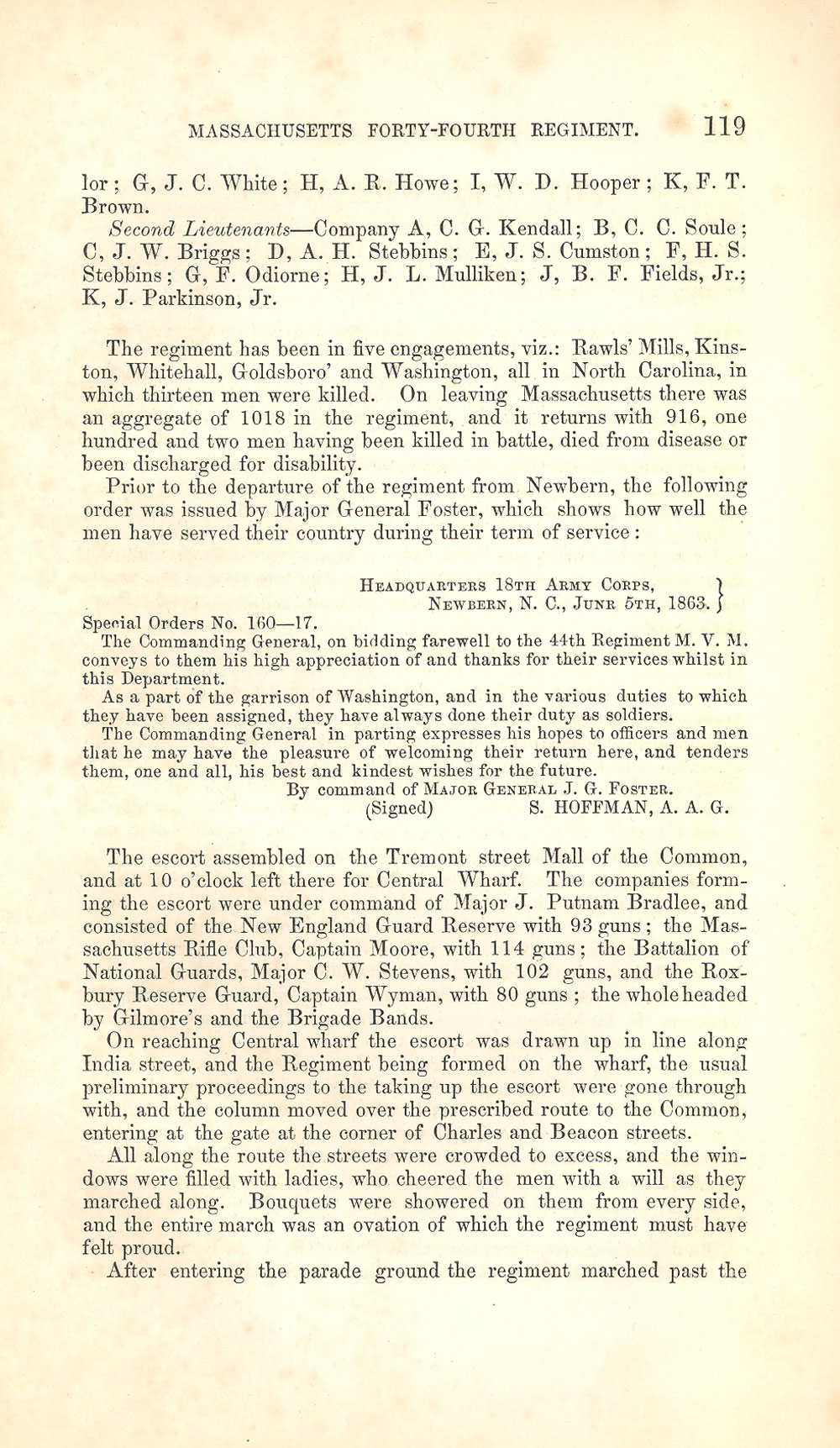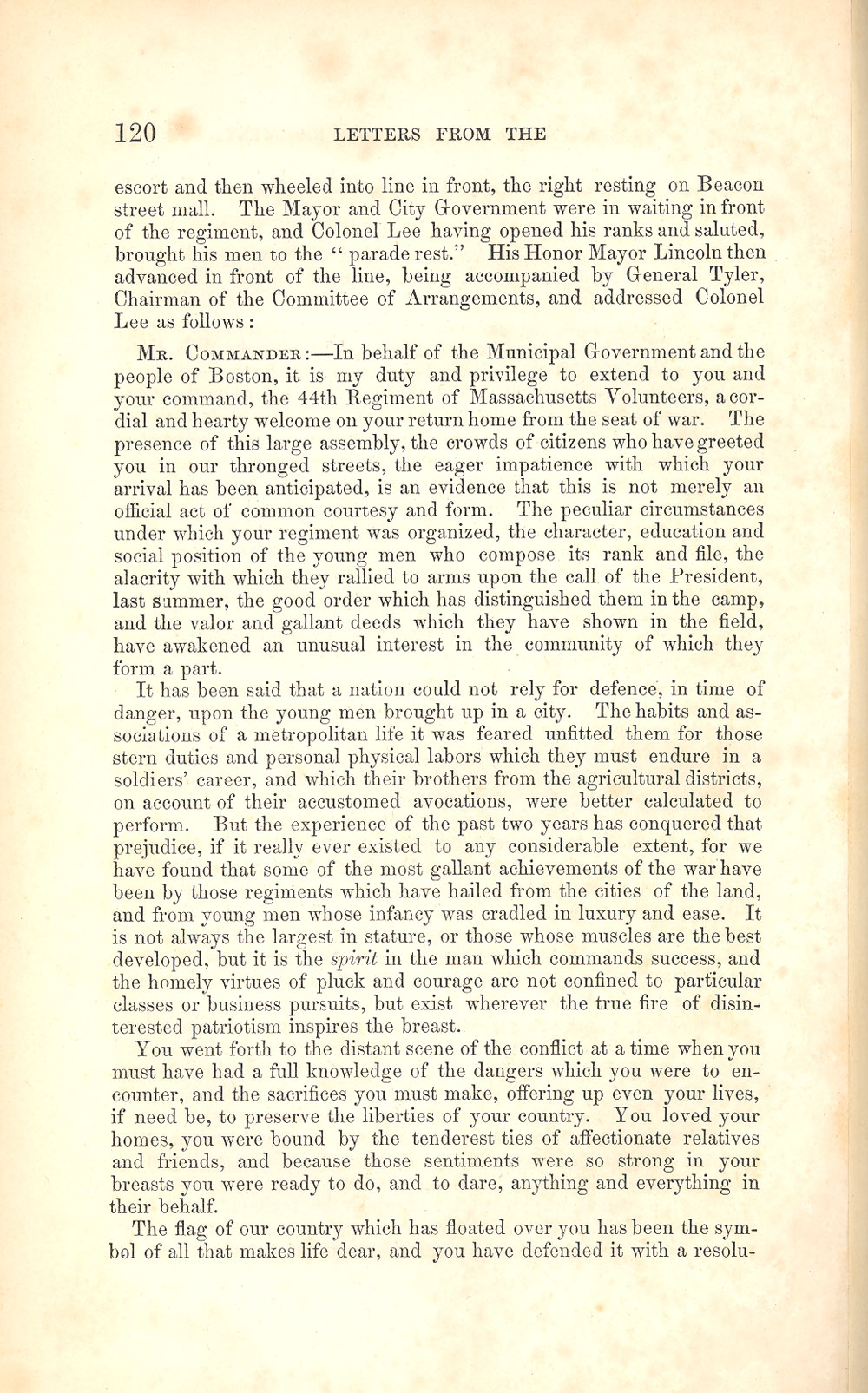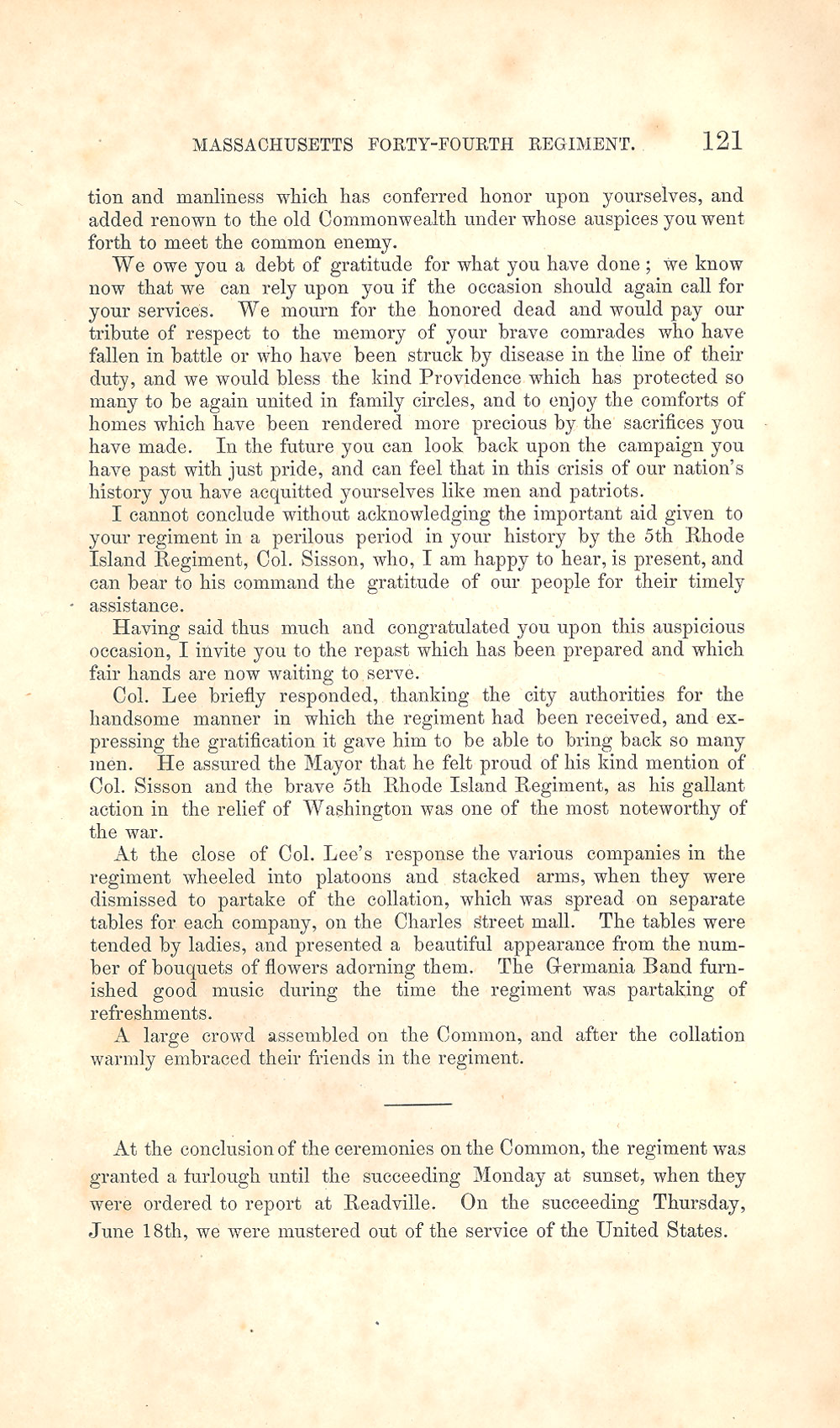Item description: Excerpt from account written by Corporal Zenas T. Haines (Company D, 44th Massachusetts Infantry Regiment), titled Letters from the Forty-Fourth Regiment M.V.M.: A Record of the Experience of a Nine Months’ Regiment in the Department of North Carolina in 1862-3 (published in Boston in 1863). The excerpt contains an article from the Boston Herald, dated 10 June 1863, describing the 44th Massachusetts Regiment’s reception upon returning home to Boston, M.A.
Item citation: From, Letters from the Forty-Fourth Regiment M.V.M.: A Record of the Experience of a Nine Months’ Regiment in the Department of North Carolina in 1862-3, by Zenas T. Haines, Boston: Printed at the Herald Job Office, 1863. Catalog Number: C970.742 H15, North Carolina Collection, University of North Carolina at Chapel Hill.
Item transcription:
THE WELCOME HOME.
The Boston Herald, of June 10th, gives the following account of the
welcome home extended to the 44th Regiment :
THE RECEPTION OF THE FORTY-FOURTH REGIMENT.
As was anticipated, the transport steamer Guide, with the right wing
of the 44th regiment, arrived here about 6 o’clock this morning, and
steamed directly up to Central Wharf, followed by the George Peabody,
and without loss of time the troops commenced to disembark, this work
being finished in less than two hours, when the two vessels left the wharf.
The regiment was drawn up by companies, and arms were stacked
and knapsacks unslung, when the men were dismissed, a guard being
mounted across the wharf. But, prior to this, a large number of men
had run up in town to see their friends, supposing their leave allowed
them this privilege, and those who did not take this view of the matter
remained on the wharf, where hundreds of their friends went to welcome
them home.
Soon after the men landed, through the forethought and liberality of
Messrs. S. J. Whall and L. M. Dyer, the men were supplied with excellent
hot coffee and bread and butter, and thanks to these gentlemen were in
every soldier’s mouth.
A pleasant incident occurred last evening as the steamer George
Peabody, with the left wing of the regiment on board, was passing Fort
Warren. The entire garrison turned out and gave continuous cheers
of welcome to the returning soldiers, the post band playing ” Home,
sweet Home.” The cheers were returned from the steamer, and were
continued until the steamer got a long distance past the fort.
The following is the Roster of the regiment. Several changes have
taken place during the term of service of the regiment :
FIELD AND STAFF.
Colonel, Francis L. Lee ; Lieutenant Colonel, E. C. Cabot ; Major,
C. W. Dabney, Jr.; Surgeon, T. W. Fisher ; Assistant Surgeon, Dan-
iel McPhee; Adjutant, E. C. Johnson; Quartermaster, F. Buah, Jr.;
Chaplain, E. H. Mall.
Non- Commissioned Staff, — Sergeant Major, Wm. H. Bird; Quar-
termaster’s Sergeant, F. S. Gifford ; Commissary’s Sergeant, C. D.
Woodberry; Hospital Steward, W. C. Brigham; Principal Musician,
G. L. BaDcock.
LINE OFFICERS.
Captains — Company A, J. M. Richardson ; B, J. M. Griswold ; C,
G. B. Lombard ; D, H. D. Sullivan ; E, S. W. Richardson; F, C. Stor-
row; G, C. Hunt; H, W. V. Smith; I, J. K. Kendall; K, R. H.
Weld.
First Lieutenants — Company A, J. Coffin ; B, J. A. Kendrick ; Jr.;
C, W. Hedge; D, J. H. Blake, Jr.; E, J. S. Newell; F, T. E. Tay-
lor ; G, J. C. White ; H, A. R. Howe; I, W. D. Hooper ; K, F. T.
Brown.
Second Lieutenants — Company A, C. G. Kendall; B, C. C. Soule;
C,J. W. Briggs; D, A. H. Stebbins; E, J. S. Cumston ; F, H. S.
Stebbins; G, F. Odiome; H, J. L. Mulliken; J, B. F. Fields, Jr.;
K, J. Parkinson, Jr.
The regiment has been in five engagements, viz.: Rawls’ Mills, Kins-
ton, Whitehall, Goldsboro’ and Washington, all in North Carolina, in
which thirteen men were killed. On leaving Massachusetts there was
an aggregate of 1018 in the regiment, and it returns with 916, one
hundred and two men having been killed in battle, died from disease or
been discharged for disability.
Prior to the departure of the regiment from Newbem, the following
order was issued by Major General Foster, which shows how well the
men have served their country during their term of service :
Headquarters 18th Army Corps,
Newbern, N. C, June 5th, 1863.
Special Orders No. 160—17.
The Commanding General, on bidding farewell to the 44th Regiment M. V. M.
conveys to them his high appreciation of and thanks for their services whilst in
this Department.
As a part of the garrison of Washington, and in the various duties to which
they have been assigned, they have always done their duty as soldiers.
The Commanding General in parting expresses his hopes to officers and men
that he may have the pleasure of welcoming their return here, and tenders
them, one and all, his best and kindest wishes for the future.
By command of Major General J. G. Foster.
(Signed) S. HOFFMAN, A. A. G.
The escort assembled on the Tremont street Mall of the Common,
and at 10 o’clock left there for Central Wharf. The companies form-
ing the escort were under command of Major J. Putnam Bradlee, and
consisted of the New England Guard Reserve with 93 guns ; the Mas-
sachusetts Rifle Club, Captain Moore, with 114 guns; the Battalion of
National Guards, Major C. W. Stevens, with 102 guns, and the Rox-
bury Reserve Guard, Captain Wyman, with 80 guns ; the whole headed
by Gilmore’s and the Brigade Bands.
On reaching Central wharf the escort was drawn up in line along
India street, and the Regiment being formed on the wharf, the usual
preliminary proceedings to the taking up the escort were gone through
with, and the column moved over the prescribed route to the Common,
entering at the gate at the comer of Charles and Beacon streets.
All along the route the streets were crowded to excess, and the win-
dows were filled with ladies, who cheered the men with a will as they
marched along. Bouquets were showered on them from every side,
and the entire march was an ovation of which the regiment must have
felt proud.
After entering the parade ground the regiment marched past the
escort and then wheeled into line in front, the right resting on Beacon
street mall. The Mayor and City Government were in waiting in front
of the regiment, and Colonel Lee having opened his ranks and saluted,
brought his men to the “parade rest.” His Honor Mayor Lincoln then
advanced in front of the line, being accompanied by General Tyler,
Chairman of the Committee of Arrangements, and addressed Colonel
Lee as follows :
MR. COMMANDER: — In behalf of the Municipal Government and the
people of Boston, it is my duty and privilege to extend to you and
your command, the 44th Regiment of Massachusetts Volunteers, a cor-
dial and hearty welcome on your return home from the seat of war. The
presence of this large assembly, the crowds of citizens who have greeted
you in our thronged streets, the eager impatience with which your
arrival has been anticipated, is an evidence that this is not merely an
official act of common courtesy and form. The peculiar circumstances
under which your regiment was organized, the character, education and
social position of the young men who compose its rank and file, the
alacrity with which they rallied to arms upon the call of the President,
last summer, the good order which has distinguished them in the camp,
and the valor and gallant deeds which they have shown in the field,
have awakened an unusual interest in the community of which they
form a part.
It has been said that a nation could not rely for defence, in time of
danger, upon the young men brought up in a city. The habits and as-
sociations of a metropolitan life it was feared unfitted them for those
stem duties and personal physical labors which they must endure in a
soldiers’ career, and which their brothers from the agricultural districts,
on account of their accustomed avocations, were better calculated to
perform. But the experience of the past two years has conquered that
prejudice, if it really ever existed to any considerable extent, for we
have found that some of the most gallant achievements of the war have
been by those regiments which have hailed from the cities of the land,
and from young men whose infancy was cradled in luxury and ease. It
is not always the largest in stature, or those whose muscles are the best
developed, but it is the spirit in the man which commands success, and
the homely virtues of pluck and courage are not confined to particular
classes or business pursuits, but exist wherever the true fire of disin-
terested patriotism inspires the breast.
You went forth to the distant scene of the conflict at a time when you
must have had a full knowledge of the dangers which you were to en-
counter, and the sacrifices you must make, offering up even your lives,
if need be, to preserve the liberties of your country. You loved your
homes, you were bound by the tenderest ties of affectionate relatives
and friends, and because those sentiments were so strong in your
breasts you were ready to do, and to dare, anything and everything in
their behalf.
The flag of our country which has floated over you has been the sym-
bol of all that makes life dear, and you have defended it with a resolu-
tion and manliness which has conferred honor upon yourselves, and
added renown to the old Commonwealth under whose auspices you went
forth to meet the common enemy.
We owe you a debt of gratitude for what you have done; we know
now that we can rely upon you if the occasion should again call for
your services. We mourn for the honored dead and would pay our
tribute of respect to the memory of your brave comrades who have
fallen in battle or who have been struck by disease in the line of their
duty, and we would bless the kind Providence which has protected so
many to be again united in family circles, and to enjoy the comforts of
homes which have been rendered more precious by the sacrifices you
have made. In the future you can look back upon the campaign you
have past with just pride, and can feel that in this crisis of our nation’s
history you have acquitted yourselves like men and patriots.
I cannot conclude without acknowledging the important aid given to
your regiment in a perilous period in your history by the 5th Rhode
Island Regiment, Col. Sisson, who, I am happy to hear, is present, and
can bear to his command the gratitude of our people for their timely
assistance.
Having said thus much and congratulated you upon this auspicious
occasion, I invite you to the repast which has been prepared and which
fair hands are now waiting to serve.
Col. Lee briefly responded, thanking the city authorities for the
handsome manner in which the regiment had been received, and ex-
pressing the gratification it gave him to be able to bring back so many
men. He assured the Mayor that he felt proud of his kind mention of
Col. Sisson and the brave 5th Rhode Island Regiment, as his gallant
action in the relief of Washington was one of the most noteworthy of
the war.
At the close of Col. Lee’s response the various companies in the
regiment wheeled into platoons and stacked arms, when they were
dismissed to partake of the collation, which was spread on separate
tables for each company, on the Charles street mall. The tables were
tended by ladies, and presented a beautiful appearance from the num-
ber of bouquets of flowers adorning them. The Germania Band furn-
ished good music during the time the regiment was partaking of
refreshments.
A large crowd assembled on the Common, and after the collation
warmly embraced their friends in the regiment.
At the conclusion of the ceremonies on the Common, the regiment was
granted a furlough until the succeeding Monday at sunset, when they
were ordered to report at Readville. On the succeeding Thursday,
June 18th, we were mustered out of the service of the United States.





